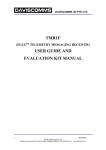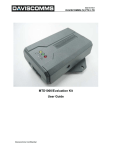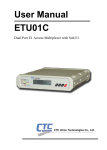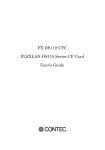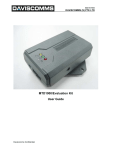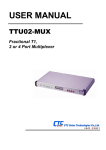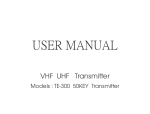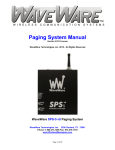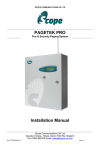Download TMR1P User Manual
Transcript
DAVISCOMMS (S) PTE LTD TMR1P (POCSAGTM TELEMETRY MESSAGING RECEIVER) USER GUIDE AND EVALUATION KIT MANUAL 1 500088R03 DAVISCOMMS (S) PTE LTD Blk70 Ubi Crescent #01-07 Singapore 408570. Tel: (65) 65471127 Fax: (65) 65471129 DAVISCOMMS (S) PTE LTD TABLE OF CONTENTS: 1. TMR1P PRODUCT FEATURES.......................................................... 3 2. TMR1P MESSAGE PROTOCOLS....................................................... 9 3. TMR1P EXAMPLES ........................................................................... 12 4. TMR1P HARDWARE AND SOFTWARE INSTALLATION............ 13 5. TMR1P ELECTRICAL SPECIFICATIONS........................................ 15 6. TMR EVALUATION KIT SETUP AND OPERATION....………….. 17 7. TMR1P 20-PIN CONNECTOR SPECIFICATION.....................….…. 25 8. TMR1P MODULE DIMENSIONS...................................................….. 26 2 500088R03 DAVISCOMMS (S) PTE LTD Blk70 Ubi Crescent #01-07 Singapore 408570. Tel: (65) 65471127 Fax: (65) 65471129 DAVISCOMMS (S) PTE LTD 1 TMR1P Product Features 1.1 Product Description The TMR1P is able to receive alphanumeric messages and send via the RS232 serial output to any industrial standard display device. The RS232 port speed of 1200/2400/4800/9600/19200 baud rate with even/odd/none parity option can be set through the TPS. TMR1P supports both numeric and alphanumeric vector. However, there are some constraints in using numeric vector to send the control codes for both control and display data, which will be specified in the relevant sections. 1.2 Receiver Frequency The TMR1P’s receive frequency is normally set during the production of the units in accordance to customers’ specifications. The receive frequency can be changed by using the TMR Programming Software (TPS) by programming the frequency synthesizer. 1.3 Multiple Addressing The TMR1P can support up to 7 POCSAG capcode addresses. 1.4 LED Indication The following table describes the different indications of the LED for different conditions: S/No 01 02 03 LED Indication Continuously on Blinking every half a second Blinking every 2 seconds until synchronization is restored Status Reset is successful EEPROM failure Lost synchronization or Out Of Range (OOR) Condition After Power on After Power on Power on and in Stand-by mode 04 Blinking every 0.3 second for up to 3 seconds Receiving a new message Power on and in Stand-by mode 1.5 Output Control Codes The TMR1P is able to control different industrial applications such as motor, relay, lighting and electronic-lock by sending the right control codes through its 8 output ports (1/0/k/s/r). When a port control code sent is “1”, the corresponding output port is set to high state or source state. 3 500088R03 DAVISCOMMS (S) PTE LTD Blk70 Ubi Crescent #01-07 Singapore 408570. Tel: (65) 65471127 Fax: (65) 65471129 DAVISCOMMS (S) PTE LTD When a port control code sent is “0”, the corresponding port is set to low state or sink state. When a port control code sent is “k”, the corresponding port’s state remains unchanged from its previous state (“k” means “keep”). When a port control code sent is “s”, the corresponding port is set to a state which is the opposite of the previous state (“s” means “toggle”). When a port control code sent is “r”, the corresponding port is reset to high impedance state (“r” means “reset”). All 8 ports can also be reset to high impedance if the reset control code “r” is sent (refer to MESSAGE PROTOCOL section), or if the device is programmed with the TPS. When the TMR1P is switched off and on again, the states of all the 8 output ports will remain unchanged. For numeric vector, the control code supported is either “0” or “1”, control code “k”, “s” and “r” are not supported. 1.6 Output Display Message The TMR1P is able to receive numeric and alphanumeric messages and send via the RS232 serial output to any industrial standard display device. The message buffer size is 10,240 bytes and the maximum message length is 4096 bytes. For continuous receiving, it can receive messages of 1000 characters. The RS232 port speed of 1200/2400/4800/9600/19200 baud rate with even/odd/none parity option can be set through the TPS. 1.7 Error Message When the TMR1P detects any errors in a received message, it will discard the message, truncate the error message, or send the error message as it is without any truncation, depending on the TPS setting (error message handling option) programmed in the unit. TPS Option: Error Message: Send/Truncate/Discard 1.8 Configuring an Output as Source or Sink Two (2) of the 8 output ports can support up to a maximum of 1A source current at High state or to sink a maximum of 1A drain current at Low state. The other 6 ports have a maximum current rating of 100mA for both source and sink (High and Low state). 1.9 Out Of Range Indication 4 500088R03 DAVISCOMMS (S) PTE LTD Blk70 Ubi Crescent #01-07 Singapore 408570. Tel: (65) 65471127 Fax: (65) 65471129 DAVISCOMMS (S) PTE LTD If Out Of Range (OOR) Indication is enabled in the TPS, the TMR1P can indicate an OOR condition. The LED on the device will blink every 2 seconds until the OOR condition disappears or the device is back to synchronization with the network. TPS Option: Out of Range : enable/disable 1.10 Serial Interface (RS232 Port) The serial interface used by the TMR is a half-duplex type. Both data and command information are sent over this interface. The serial interface can be reconfigured to match to the host equipment by means of some special paging codes. The TPS allows settings of the baud rate and parity bit to be changed. TPS Options: Parity: Even/Odd/None Baud rate: 1200/2400/4800/9600/19200 bps 1.11 Flow Control Communications between the TMR1P and the host is done asynchronously through the RS232 or TTL serial ports (TXD output). A signal is generated to alert the host equipment that a message is available. This is done by asserting the RTS line. There is also a clear-to-send (CTS) line from the host to the TMR1P that signals the host is ready to accept commands. The TMR1P is able to buffer 10,240 bytes of data before it overflows. TPS Option: Flow Control: enable/disable 1.12 Serial Data To automatically send data out the serial port, the Flow Control programming option in the TPS must be disabled. If the Flow Control is enabled, the user can have more control over the message. These features are further described in the following sections. 1.13 RTS Control This option allows the use of the RTS line to indicate to the external host device that there is a new page data ready to be sent out of the serial port. This line will turn to logic low when the TMR1P is ready to send data out of the serial port. 1.14 CTS Control 5 500088R03 DAVISCOMMS (S) PTE LTD Blk70 Ubi Crescent #01-07 Singapore 408570. Tel: (65) 65471127 Fax: (65) 65471129 DAVISCOMMS (S) PTE LTD If flow control is enabled, the CTS line is used to determine if the host is ready to receive data from the TMR1P. When the host has received an RTS and is ready to receive the data, a logic high is asserted. If the host disables the CTS line while the complete message is not fully received, TMR1P will perform timeout for 10 seconds. If the host re-asserts the CTS line before timeout, the TMR1P will continue to send out the remaining message to the host. If the CTS line is asserted after timeout, the TMR1P will resend the entire message provided the message has not been overwritten by the incoming paging messages. When CTS is asserted, TMR will delay for a programmable interval before sending out data. This programmable delay is a TPS option. TPS Option: CTS Response Delay: (0 – 10000ms) 1.15 Over-the-Air (OTA) Programming Over-the-air (OTA) programming is a method of changing TMR1P settings without requiring the TMR1P to be physically connected to a PC. OTA programming commands are transmitted over the paging system as alphanumeric messages. You can use the TMR1P TPS (Telemetry Programming Software) to generate the OTA strings that are to be sent to TMR1P. The TPS itself does not send the OTA strings; separate paging software is required for that. OTA reprogramming can only be used with TMR1P that had the OTA password field set when they were last programmed through a connection to PC. Each TMR1P will only process OTA messages received on Capcode 1. The TMR1P will not process OTA messages received on other capcodes. Additionally, the TMR1P cannot process OTA messages where there was an error in transmission, or if the TMR1P is off. For more information on OTA programming, please refer to the on-line help file in the TMR1P TPS. Cautions: When an OTA string of incorrect password is received 8 times by a TMR, it will set the RF Disable Bit in the EEPROM and disable the receiver permanently. The only way out is to erase the EEPROM and start afresh. If OTA is attempted with a correct password prior to the 8th incorrect password, the TMR will reset the OTA password count to 0, thus allowing 8 more tries. A page is considered as a candidate for a valid OTA string as long as the OTA header matches “)&)NP1”. The purpose of such design is to prevent unauthorised users from hacking the TMR via OTA. 1.16 Sub-Address Control 6 500088R03 DAVISCOMMS (S) PTE LTD Blk70 Ubi Crescent #01-07 Singapore 408570. Tel: (65) 65471127 Fax: (65) 65471129 DAVISCOMMS (S) PTE LTD The TMR1P processes the received data only when the sub-address received is correct. The subaddress (4-characters: 0~9, a~z, A~Z) can be programmed via the TPS. For numeric vector, the sub-address is supported only from character “0” to “9”. TPS Option: Sub-address Control: enable/disable Sub-address: (4 characters, char type: 0~9, a~z, A~Z) 1.17 Message Header Control (used for display data through the serial port) For the convenience to display messages in different display devices, the TMR1P can send up to 40 pairs of Hex codes or 80 characters (“0”~”F”) in total through its serial port There are two kinds of message headers. Header1 (up to 20 pairs of Hex codes) can be pre-programmed or disabled by the user in the TPS. Header2 (up to 20 pairs of Hex codes) can be sent out together with the message sent by the user or operator. For numeric vector, the 20 pairs of hex codes for header 2 is supported only from character “0” to “9”. (Refer to Section 3 Message Protocol) The header will be treated as displayed data under the following conditions: invalid hex code, hex codes not in pair, no “[[ ]]” pair, or more than 20 pairs of hex codes in either header 1 or header 2. TPS Option: Msg-Header Control: enable/disable Msg-Header: 1~20 pairs, ‘0’~’F’ characters (2~40 characters, must be even or in pairs) 1.18 Message Trailer Control (used for display data through the serial port) For the same reason above, the TMR1P can also send two kinds of message trailers through its serial port to different display devices. Trailer2 (up to 20 pairs of Hex codes) can be pre-programmed or disabled by the user in the TPS. Trailer1 (up to 20 pairs hex codes) can be sent out together with the message sent by the user. For numeric vector, the 20 pairs of hex codes for trailer 1 is supported only from character “0” to “9”. (Refer to Section 3 Message Protocol) The trailer will be treated as displayed data under the following conditions: invalid hex code or hex codes not in pair. If there are more than 20 pairs of hex codes in either trailer 1 or trailer 2, the excess characters will be truncated and the remaining 40 characters will be processed to determine whether it is a valid trailer. TPS Option: Msg-Trailer Control: user/default/disable Msg-Trailer (when “user” is selected): 1~20 pairs ‘0’~’F’ charactersr (2~40 characters, must be even or in pairs) Msg-Trailer (when “default” is selected): EOT (04) 7 500088R03 DAVISCOMMS (S) PTE LTD Blk70 Ubi Crescent #01-07 Singapore 408570. Tel: (65) 65471127 Fax: (65) 65471129 DAVISCOMMS (S) PTE LTD 1.19 Message Source ID Control The TMR1P can send any index number of the 7 capcode addresses at the start of a message and this function can be enabled or disabled by the user in the TPS. TPS Option: Msg-Source ID: enable/disable 8 500088R03 DAVISCOMMS (S) PTE LTD Blk70 Ubi Crescent #01-07 Singapore 408570. Tel: (65) 65471127 Fax: (65) 65471129 DAVISCOMMS (S) PTE LTD 2 TMR1P Message Protocol 2.1 Control Data Profile This is used to send control commands to the 8 output ports for control purpose. Message Format: (Sub-address) + Prefix + Control data TPS Option: Control Data Prefix: “[“ / “#” Sub-address: 4 Characters Prefix: “[[[“ or “###” is a TPS (0~9, a~z, A~Z) programmable This Sub-address can be option. It is the enabled or disabled via label of output control code. the TPS. Control data: “[“ + P1P2P3P4P5P6P7P8 + ”]” are used to control the 8 output ports. Note: “[ ]” pair must exist which is the subprefix of the control code. P1~P8 represents the control code sent to the 8 corresponding ports and stands for either one of the characters: “1”, “0”, “k” or “K” or “s” or “S”. “1”- the corresponding output port set to logic high (source) “0”- the corresponding output port set to logic low (sink) “k” or “K” - the corresponding output port’s state remains unchanged from the previous state “s” or “S” - the corresponding output port toggles to the opposite state from the previous state “r” or “R” - the corresponding output port is reset to high impedance state User can also send a shorter command to control the 8 output ports. However, the states of the 8 output ports will be identical after the control data is received successfully. The message format is the same, except the Control data. 9 500088R03 DAVISCOMMS (S) PTE LTD Blk70 Ubi Crescent #01-07 Singapore 408570. Tel: (65) 65471127 Fax: (65) 65471129 DAVISCOMMS (S) PTE LTD Sub-address: 4 Characters Prefix: “[[[“ or “###” is a TPS (0~9, a~z,, A~Z) programmable This Sub-address can be option. It is the enabled or disabled via label of output the TPS. control code. Control data: “[“ + P + “]” are used to control the 8 output ports. Note: “[ ]” pair must exist which is the subprefix of the control code. P represents the control code sent simultaneously to the 8 corresponding ports and stands for either one of the characters: “1”, “0”, “k” or “K” or “s” or “S”. “1”- all the 8 output ports set to logic high (source) “0”- all the 8 output ports set to logic low (sink) “k” or “K” - all the 8 output ports’ states remain unchanged from the previous states “s” or “S” - all the 8 output ports toggle to the opposite states from the previous states “r” or “R” - all the 8 output ports are Reset to high impedance state. This is the same state as when the TMR1P has just been programmed by the TPS. 2.2 Display Data Profile This is used to send control commands to the RS232 serial output port for display control purpose. Message format: (Sub-address) + (Header1 + Header2) + (Source ID) + Display data + (Trailer1 + Trailer2) Message Format of the message that the user sends: Sub-address: 4 Characters “[[“ + Header2 + “]]” (0~9, a~z,, A~Z) Character type: “0”~”F” This Sub-address can be (2~40 characters, must enabled or disabled via the be even or in pairs) TPS. If there is no “[[ ]]” pair, the TMR1P will treat the Header2 as display data. Display data: Up to 3000 characters per message 10 “??” + Trailer1 Character type: “0”~”F” (2~40 characters, must be even or in pairs) Note: Label “??” is the prefix of Trailer1. This Trailer label will be selectable through 500088R03 DAVISCOMMS (S) PTE LTD Blk70 Ubi Crescent #01-07 Singapore 408570. Tel: (65) 65471127 Fax: (65) 65471129 DAVISCOMMS (S) PTE LTD the Windows TPS . For numeric message source, (‘0’ to ‘9’, ‘*’, ‘U’, ‘-‘, ‘[‘, or ‘]’) can be used as the trailer delimiter. Message Format of the data that the TMR1P sends to the RS232 serial output port: Display data: Up Trailer1 + Trailer2 Header1 + Header2 (value “(“ + Source ID + ” )” to 3000 (value is Hex 0~F) is Hex 0~F) characters Trailer1 (up to 20 Header1 (up to 20 pairs of This is the index number per message pairs hex codes) is Hex codes) can be pre- of the capcode address the one that is sent programmed or disabled by and can be enabled or out by the user. disabled by the user in the user in the TPS. the TPS Trailer2 (up to 20 Header2 (up to 20 pairs of pairs of Hex codes) Hex codes) is the one that can be preis sent out by the user. programmed or disabled by the user in the TPS. 11 500088R03 DAVISCOMMS (S) PTE LTD Blk70 Ubi Crescent #01-07 Singapore 408570. Tel: (65) 65471127 Fax: (65) 65471129 DAVISCOMMS (S) PTE LTD 3 TMR1P Examples Assuming the Sub-address is “1234”, Header1 is pre-programmed using the TPS as “00ff”, Trailer2 is pre-programmed as “eeff”, and the Source ID is enabled with the capcode index of the capcode address that the TMR1P is receiving the message as 4. 3.1 Example 1 If the user sends out the following page: “1234[[[[1011k0t1]” Interpretation: This is to control the 8 output ports. Sub-address is "1234", ports P1, P3, P4 and P8 are set to logic high, ports P2 and P6 are set low, port P5’s state remained unchanged, and port P6’s state is toggled to the opposite state from the previous state. 3.2 Example 2 Assuming the Sub-address is now disabled through the TPS and if the user sends out the following page: “[[[[1011k0k1]” Interpretation: This is to control the 8 output ports. Sub-address is "1234", ports P1, P3, P4 and P8 are set to logic high, ports P2 and P6 are set low, port P5’s state remained unchanged, and port P6’s state is toggled to the opposite state from the previous state. 3.3 Example 3 i) If the user sends out the following page: “1234 [[[[1]” Interpretation: This is to control all the 8 output ports simultaneously and in this case, all ports will be set to logic High (source). ii) If the user sends out the following page: “1234 [[[[0]” Interpretation: This is to control all the 8 output ports simultaneously and in this case, all ports will be set to logic Low (sink). iii) If the user sends out the following page: “1234 [[[[s]” Interpretation: This is to control all the 8 output ports simultaneously and in this case, all ports will be set to the logic state which is the opposite of the previous state. iv) If the user sends out the following page: “1234 [[[[k]” Interpretation: This is to control all the 8 output ports simultaneously and in this case, all ports will be remain at the same as state as the previous state. 12 500088R03 DAVISCOMMS (S) PTE LTD Blk70 Ubi Crescent #01-07 Singapore 408570. Tel: (65) 65471127 Fax: (65) 65471129 DAVISCOMMS (S) PTE LTD iv) If the user sends out the following page: “1234 [[[[r]” Interpretation: This will Reset all the 8 ports to high impedance state 3.4 Example 4 If the user sends out the following page: “1234Daviscomms”, without the prefix “[[[“ Interpretation: Since there is no “[[[“ prefix, it is not meant to control the 8 output ports. The display data is “Daviscomms”. The TMR1P will send Header1 “00ff”, Source ID “4”, Trailer2 “eeff” and the message data “Daviscomms” to the RS232 serial output. 3.5 Example 5 If the user sends out the following page: “1234[[A25BF6]]Daviscomms??22446688AA”, without the prefix “[[[“ Interpretation: Since there is no “[[[“ prefix, it is not meant to control the 8 output ports. The display data is “Daviscomms”. The TMR1P will send Header1 “00ff”, Header2 “A25BF6”, Source ID “4”, Trailer1 “22446688AA “, Trailer2 “eeff” and the message data “Daviscomms” to the RS232 serial output. 4. TMR1P HARDWARE AND SOFTWARE INSTALLATION Installing programming software and connecting test cables are described in this section. 4.1 System Requirements Please make sure your system meets the following requirements: - Intel Pentium or better processor - 16 MB of RAM - Microsoft Window 98 2ed, Windows 2000 or Windows XP operating systems 4.2 Software Installation 1. The programming software is downloadable from http://www.daviscomms.com.sg/pager_software.html 2. The current software installation file is TMR1P TPS1.05.EXE. Follow the step-by-step instructions on the screen during the installation. 4.3 Programming Kit Hardware 13 500088R03 DAVISCOMMS (S) PTE LTD Blk70 Ubi Crescent #01-07 Singapore 408570. Tel: (65) 65471127 Fax: (65) 65471129 DAVISCOMMS (S) PTE LTD Please ensure you have the following: • TMR1P • Parallel cable (with DB25 connectors) • Programmer box (rectangular black box) • Power adapter for programmer box • Programmer cable (thin cable, 4-pin prong on one end and RJ-11 on the other end) 4.4 Programming Kit Hardware Setup 1. Locate the parallel port (LPT1) on the rear of your computer, and connect the 25-pin parallel cable. If you have another device connected (such as a printer), please disconnect that device first. 2. Connect the other end of the parallel cable to the programmer box. 3. Connect the small end of the TMR1P programmer cable to the programmer box (the connector looks like a phone jack). 4. Connect the power adapter to the programmer box, and plug it into a working socket. A green light on the box indicates it is functioning. 5. Connect the 4-prong end of the TMR1P programmer cable to TMR1P by inserting it into the four gold contacts on the TMR1P, making sure that the notched end of the connector faces away from the circuit board. It is not necessary to power on the TMR1P unit if you use the programmer box package. Programming Kit Setup Programmer Cable setup 14 500088R03 DAVISCOMMS (S) PTE LTD Blk70 Ubi Crescent #01-07 Singapore 408570. Tel: (65) 65471127 Fax: (65) 65471129 DAVISCOMMS (S) PTE LTD 5. TMR1P ELECTRICAL SPECIFICATION S/No 01 02 03 04 05 06 07 08 09 Electrical Specifications Operating Frequency VHF UHF 900Mhz Channel Spacing Frequency Deviation Frequency Step Size VHF UHF 900MHz Frequency Stability VHF UHF 900MHz Paging Protocol POCSAG Supply Voltage To pager system To interface circuit Current Drain (with 3V supply voltage) Peak Receive, I/O at high impedance Receive off, I/O at high impedance Maximum Allowable B+ Current Temperature Operating for VHF & UHF 15 Range Unit 135 -- 175 452 -- 468 929 -- 932 25 ±4.5 MHz MHz MHz KHz KHz 5 12.5 25 KHz KHz KHz ±15 ±5 ±2.5 PPM PPM PPM 512/1200/2400 Bps 3V~5V, 8V~15V 3V~15V V V 15 4 1 mA mA A -10 to +50 °C 500088R03 DAVISCOMMS (S) PTE LTD Blk70 Ubi Crescent #01-07 Singapore 408570. Tel: (65) 65471127 Fax: (65) 65471129 DAVISCOMMS (S) PTE LTD 10 11 12 13 S/No 1 2 3 4 5 S/No 1 Operating for 900MHz Storage Page Sensitivity 1200 Baud (TEM C.F = 22.5) VHF/UHF 900MHz EIA Selectivity @ 25kHz VHF/UHF 900MHz Image & Spurious Rejection VHF/UHF 900MHz Low level Intermodulation Rejection VHF/UHF 900MHz Inputs / Outputs 2 DC Power Supply Inputs 1 TXD Output for Serial Data Operation 1 RXD Input for Serial Data Operation (not supportable for current version) Serial Port Baud Rates (Bps) 8 Customer Configurable Outputs General Physical Dimension 2 3 Weight RF Input 4 20-Pin Connector Interface 5 Programming Interface +5 to +40 -40 to +80 °C °C -107 -104 dBm dBm > 55 > 50 dB dB > 50 > 40 dB dB > 50 > 40 dB dB +3~5V or +8~15V RS232 or TTL Output RS232 or TTL Output 2400, 4800, 9600, 19200 2 ports at 1A, 6 ports at 100mA. Current Source (logic 1) and Sink (logic 0) 50mm x 50mm x 10mm (L x W x H) 30g Internal built-in Antenna (standard). External with BNC or OSX female connector (optional) 20-pin male connector for voltage supply, RS232, TTL and 8 I/O’s. 4-pin pads to be used with Parallel Programming Kit supplied by Daviscomms (or through pin1(sdata), pin9 (clk), power supply and ground pins of 20-pin Connector Interface) 16 500088R03 DAVISCOMMS (S) PTE LTD Blk70 Ubi Crescent #01-07 Singapore 408570. Tel: (65) 65471127 Fax: (65) 65471129 DAVISCOMMS (S) PTE LTD 6. TMR EVALUATION KIT SET-UPS AND OPERATION The Evaluation board is designed to facilitate the testing and evaluation of the TMR1P receiver modules. It contains the following features: • Built-in regulated DC power supply • LED status indicators for the digital outputs • Jumpers to select power source for the TMR1P • Jumpers to select serial port operating mode (RS232 or TTL) • Connection to programming cable 6.1 Evaluation Kit Hardware Evaluation Board Power Adapter, 12Vdc, 1 amp Serial Cable; D-Sub 9 pins (male) to D-Sub 9 pins (female) Programming Cable, DB25 female to RJ-45 (8 pins) 6.2 Evaluation Board Features. - The Evaluation Board is designed to aid in programming, testing and to develop new applications for the TMR1P Module. - The 8 LEDs monitor signals sent to the digital outputs, D0 to D7. - An LED turns on when the output bit is set to Logic High. - An LED will turn off when the output bit is set to Logic Low or to High Impedance. See Section 1.3, Output Control Codes, for information on how to send messages to the TMR1P to control the digital output bits. The Frequency and Capcodes can be programmed on the attached TMR1P module through the Parallel Port on a PC. This will allow programming the TMR1P when it is connected to the Evaluation Board. 17 500088R03 DAVISCOMMS (S) PTE LTD Blk70 Ubi Crescent #01-07 Singapore 408570. Tel: (65) 65471127 Fax: (65) 65471129 DAVISCOMMS (S) PTE LTD 12VDC power adapter D-sub 9-pin Serial cable (male) to connector on the Evaluation Board Telemetry Message Receiver (TMR Module) RJ-45 cable to the RJ-45 connector on the Evaluation Board Figure 1. Evaluation Kit set-up with TMR module, Evaluation Board and various cables. 1. Plug the TMR module 20-pin connector into the Evaluation Board 20 pins connector (Fig. 1). 2. Connect RJ-45 connector to the RJ-45 Jack on the Evaluation Board (Fig. 1). Connect DB25pin connector of the programming cable to Parallel Port on PC (Fig.2). (This connection need only be made if the TMR will be re-programmed with a new frequency or CAP code.) 3. Connect the male portion of the D-Sub 9-pins serial cable to connector on the Evaluation Board (Fig. 1). Connect female portion of the D-Sub 9-pins serial cable to the Serial Ports (COM ports) on PC (Fig.2). 4. Connect power connector (12Vdc adapter) into power jack on the Evaluation Board. 5. The power LED will light on the Evaluation Board and on the TMR module. 18 500088R03 DAVISCOMMS (S) PTE LTD Blk70 Ubi Crescent #01-07 Singapore 408570. Tel: (65) 65471127 Fax: (65) 65471129 DAVISCOMMS (S) PTE LTD D-Sub 9-pin connector to Serial Port (COM ports) of PC DB25-pin connector to Parallel Port (LPT1) of PC Fig 2. Set-up at PC Side (Back of PC) 19 500088R03 DAVISCOMMS (S) PTE LTD Blk70 Ubi Crescent #01-07 Singapore 408570. Tel: (65) 65471127 Fax: (65) 65471129 DAVISCOMMS (S) PTE LTD 6.3 Hardware Jumper Settings For TMR Evaluation Board ! Warning, If VIN2 (J4) is used to power the TMR, then VIN1 (J5) should not be used and should be left open by removing the jumper at JP3or moving the jumper to pin3 position at JP3. 3.6 Position 3.7 Description 3.8 Comments JP1 VIN3 selection Put jumper across pins 1-2 (default +5Vposition) to power the TMR digital outputs from the Evaluation Board +5VDC supply. Put jumper across pins 2-3 ( EXT position ) to power the TMR’s digital outputs from an EXT 3 to 15 VDC power source connected to J6. JP2 TTL/RS232 level select Put jumper across pins 1-2 for RS-232 levels on the D-Sub 9 pin serial connection (default). Put jumper across pins 2-3 for TTL levels on the D-Sub 9 pin serial connection. JP3 VIN1 selection, or Vin2 selection Put jumper across pins 1-2 (default +5V position) to power the TMR from the Evaluation Board’s+5VDC supply. Put jumper across pins 2-3 (EXT position) to power the TMR from external 3 to 5VDC power source connected to J5 for VIN1 input, or 8 – 15Vdc power source connected to J4 for VIN2 input. JP5 and JP6 Flow control selection Put jumper across JP5 and JP6 to enable flow control feature (Default) 21 500088R03 DAVISCOMMS (S) PTE LTD Blk70 Ubi Crescent #01-07 Singapore 408570. Tel: (65) 65471127 Fax: (65) 65471129 Fax: (65) 65471129 PIN 3 PIN 1 TMR EVALUATION BOARD RJ-45 Connector D-Sub 9 pin Serial Connector 20 pin connector 22 500088R03 DAVISCOMMS (S) PTE LTD When you connect power (8V to 15V) to the VIN2 connection at J4, the jumper at JP3 should be removed or placed in the EXT position with J5 (VIN1) left unconnected. When you connect Power to J5 (3V to 5V), change the jumper block on JP3 to connect Pin 2 (VIN1) to Pin 3 (EXT) and leave J4 (VIN2) unconnected. When you connect power to J6 (3V to 15V) Change the jumper block on JP1 to connect Pin 2 (VIN3) to Pin3 (EXT). If you are using a module that has TTL output, not RS232, switch both JP2 and JP4 to connect Pin 2 and Pin 3 (TTL). 6.4 TMR Evaluation Board Schematic (Refer to the next page) 23 500088R03 DAVISCOMMS (S) PTE LTD Blk70 Ubi Crescent #01-07 Singapore 408570. Tel: (65) 65471127 Fax: (65) 65471129 Fax: (65) 65471129 500088R03 TMR EVALUATION BOARD SCHEMATICS 24 DAVISCOMMS (S) PTE LTD 7. TMR1P 20-PIN CONNECTOR SPECIFICATION No. 1 2 3 4 5 6 7 8 9 10 Description SDATA D0 - 1 Amp D2 D4 D6 TX1-RS232 level TXD-TTL level VINI CLK GND No. 11 12 13 14 15 16 17 18 19 20 Description VIN3 D1 – 1 Amp D3 D5 D7 RTS CTS LED VIN2 GND VIN1 - Power Supply for Pager System, 3.0V-5.0V VIN2 - Power Supply for Pager System, 8.0V-15.0V VIN3 - Power Supply for Customer Configurable Ports, 3.0V-15.0V Note: Please DO NOT use VIN1 and VIN2 at the same time 25 500088R03 DAVISCOMMS (S) PTE LTD Blk70 Ubi Crescent #01-07 Singapore 408570. Tel: (65) 65471127 Fax: (65) 65471129 Fax: (65) 65471129 DAVISCOMMS (S) PTE LTD 8. MODULE DIMENSIONS 26 500088R03 DAVISCOMMS (S) PTE LTD Blk70 Ubi Crescent #01-07 Singapore 408570. Tel: (65) 65471127 Fax: (65) 65471129 Fax: (65) 65471129


























